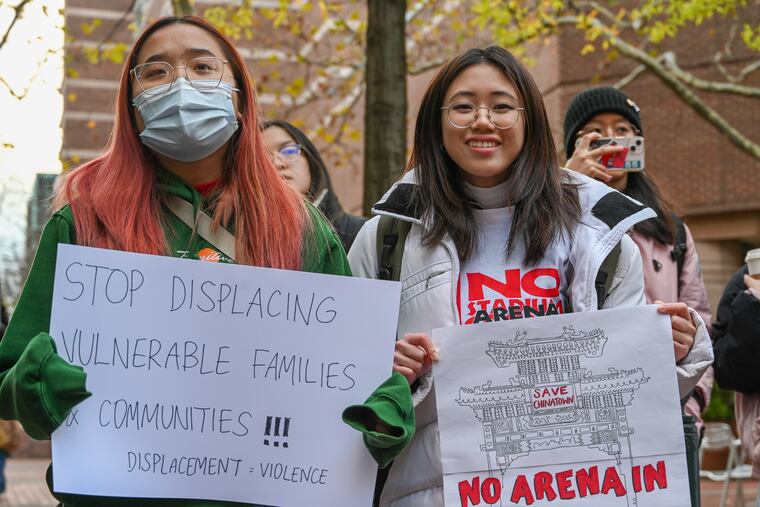Letters to the Editor | Dec. 5, 2022
Inquirer readers on the potential impact of the proposed Sixers arena on Chinatown and treacherous traffic intersections.

Reading the signs
I live in Fairmount and belong to one of the boat clubs. Consequently, I am often driving or walking across Kelly Drive by the Philadelphia Museum of Art. I would like the city to consider removing all of the 35 mph signs and “No trucks” signs. These are completely ignored, with several trucks (and cars) driving in excess of 70 mph. It is very confusing as to whether any of the other signs should be taken seriously when everyone chooses to ignore those two. For example, the no left turn arrow sign at the Falls Bridge, which is treated as optional, at best. I would, however, like to add some signage at the traffic lights by the museum, which would say “Red lights optional.” Pedestrians take their lives in their hands crossing at these intersections. Waiting for a light to turn green before walking is simply not enough, as drivers pay no attention. One might assume the police could have a field day pulling over and ticketing vehicles, but that would require police to have a presence on Kelly Drive. I think there may be a “No police allowed” sign that I missed.
Robert Ellis, Philadelphia, robertj423@hotmail.com
A well-rounded education
The recent op-ed, “High schools are not teaching students the skills that they need,” and the letter to the editor, “Teach life skills to students,” start with reasonable requests that schools teach practical life skills, but they then drive the notion of “education” straight into the ditch. The op-ed claims “math is special because, on top of being useless, it’s hard.” The letter writer claims, “I’ve never used half the stuff I was taught, such as algebra.” As a doctoral engineer, I don’t “use” history, macroeconomics, and philosophy every day, but I’m a better citizen for having some understanding of these subjects. That’s true of science and math, too. Science is how we understand the natural world and develop technology, and math is the language of the sciences. When we leave science and math to the STEM types, we get a citizenry dismissive of the threats of climate change and afraid of COVID-19 vaccines. It is time we stopped debating the superiority of scientific vs. liberal arts education; well-educated citizens need an understanding of a wide range of subjects.
Bob Leipold, West Chester
Nightmare on 26th Street
What are the chances that one family with two kids in the back gets rear-ended twice at the exact same spot, totaling their car both times? This happened to us on 26th Street, going southbound toward Penrose Avenue, an essential connector between Interstates 76 and 95. Both times, out-of-state drivers were at fault, most recently on Thanksgiving Day. I’m giving thanks that my family escaped unscathed. But these incidents are not bad luck. I implore the Philadelphia Streets Department, the Bellwether District, and the Navy Yard to strongly consider the safety and redesign of this thoroughfare. Don’t wait until the next family writes in — or can’t.
Gretchen Elise Walker, Philadelphia, gretchenelisemusic@gmail.com
Dump arena, build a cap
I agree with many Chinatown community members (and Sam Katz) that the proposed arena at 10th and Market Streets threatens the well-being of the Chinatown community. However, if the development were to proceed, I’d propose that the developers, along with potentially available public funding, build a cap over the Vine Street Expressway modeled after the proposed Interstate 95 cap. Ideally, such a cap would run from 12th Street to Eighth Street, based on the east and west boundaries of Chinatown, providing much-needed green space and other park amenities for the community while geographically reunifying the area. In fact, the best outcome would be to scuttle the arena and build the cap.
Dan Drecksage, Philadelphia
Where are the facts?
In America’s court system, defendants are presumed innocent until proven guilty, and that requires the prosecution to present actual facts. With the requirement that someone be “guilty beyond a reasonable doubt,” courts err on the side of letting a guilty person go free rather than unjustly jailing an innocent person. Accordingly, I find it disturbing that election deniers ask us to accept there is widespread election fraud, yet they are unwilling or unable to provide facts proving that material fraud occurred. It seems they are treating the election as fraudulent — guilty until proven innocent — rather than vice versa. In order to refute election results, deniers should have to prove the fraud occurred, rather than election officials prove the election was legitimate.
Kent Kingan, Malvern
Let the punishment fit the crime
Marcos Panayiotou of Burlington County received two weeks of intermittent incarceration for his actions in the Jan. 6, 2021, riot at the U.S. Capitol. This sentence seems to understate the breadth, depth, and gravity of what happened that day. Numerous law enforcement officers suffered injuries, including broken ribs, smashed spinal disks, and concussions. One officer lost his eye. One died. Officer Daniel Hodges, crushed in a doorway, explained that rioters beat him with a baton. He said protesters were “absolutely crazed,” and he thought he was going to die. The mob was wielding sledgehammers, baseball bats, hockey sticks, and flagpoles. Viewers of the videos of the riot could easily observe this mayhem. So, given the extent of the violence resulting in severe injury and death, we must be sure that the punishment fits the crime, with perpetrators receiving severe penalties, those from the Philadelphia area included.
Ken Leftowitz, Medford
Join the conversation: Send letters to letters@inquirer.com. Limit length to 150 words and include home address and day and evening phone number. Letters run in The Inquirer six days a week on the editorial pages and online.